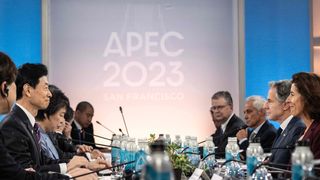The much-anticipated Xi-Biden meeting is not the only diplomacy slated for the sidelines of the upcoming APEC summit. A meeting between parties to the Comprehensive and Progressive Agreement for Trans-Pacific Partnership (CPTPP) is also on the agenda, the first with newly acceded Britain in attendance.
The CPTPP, successor to the US-led Trans-Pacific Partnership, is a regional free trade pact between 12 Indo-Pacific economies, including Australia. The Biden administration has not reneged on former president Trump’s TPP withdrawal, instead pivoting to a new regional trade initiative, IPEF, while China has since finalised an almost-decade-in-the-making, 14-country strong free trade deal of its own, RCEP.
Two years on from its formal request to join the CPTPP, Beijing is not giving up on its ambitions to gain access to the pact — an issue which Chinese President Xi Jinping reportedly raised during his recent meeting with Australian Prime Minister Anthony Albanese.
So, what stands between Beijing and accession to the CPTPP?
Parties to the CPTPP must adhere to the agreement’s high standards and trade rules aimed at fostering a regional market environment that is inclusive, transparent and fair. To gain access to the agreement, an applicant requires unanimous approval from all 12 member countries.
Australia, still reeling from China’s coercive economic campaign and ongoing bans on certain Australian imports, has not responded warmly to Beijing's application but has left the door open for reconsidering its stance. Japan has more pointedly opposed China’s accession to the CPTPP, reiterating that unfair trade practices undermine the ‘spirit’ of the agreement.
These concerns about China underwriting regional norms may be technical, but are also undeniably political — and are echoed by the Australian and Japanese people.
New polling by the United States Studies Centre finds that the Australian and Japanese publics continue to hold strikingly negative views about China’s influence in the region. Just over half of respondents in both countries think China is mostly harmful in Asia, while less than 16 per cent say China is mostly helpful.
This stands in stark contrast to perspectives on the US role in the region. A plurality of Australians (29 per cent) believe the United States is mostly helpful in Asia, with a strong majority (55 per cent) of Japanese respondents sharing this view‚ almost 10 times as many as those who believe the United States is mostly harmful.
China’s membership bid for the CPTPP remains unlikely to bear fruit. But the situation is yet another reminder of the tensions between Australia's trade and geopolitical interests in the age of strategic competition — a friction that will only grow more acute as the United States and its allies seek to defend their vision of a rules-based regional order.
A version of this article was first published in the weekly newsletter 'The 46th'. Subscribe to The 46th here.






